What's needed for the next successful web3 game? GamesBeat Summit 2023 panel
June 12 2023
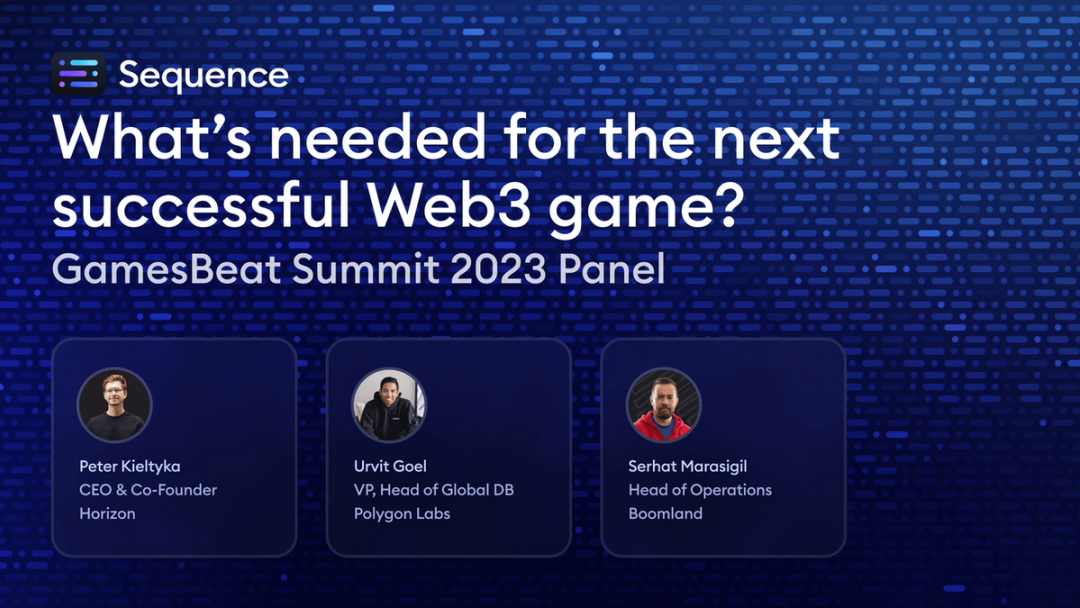
On May 22, the 15th edition of GamesBeat Summit kicked off in Marina del Rey, CA. Our CEO Peter Kiletyka took the chance to sit down with fellow web3 gaming execs on the panel “Time to Level Up What's needed for the next successful Web3 game”, a discussion about the core challenges that currently exist for web3 games, and how studios are (or aren’t) solving them.
Full video here:
Panel speakers:
Peter Kieltyka - CEO and Co-founder - Horizon
Urvit Goel - VP, Head of Global Business Development - Polygon Labs
Serhat Marasligil - Head of Operations - Boomland
Main Panel Takeaways
- The blockchain gaming ecosystem is developing faster than ever before, gamers experience should always be top of mind, and, thanks to the latest technology developments, it gets easier and easier for developers to create games with web3 features players will love.
- Common challenges to integrating web3 into games include understanding on-chain concepts such as wallet and tokens, but also setting up a proper web3 development stack that allows for seamless developer and user experiences, and ensuring game scalability.
- The real opportunities for game studios to level up their web3 game include leveraging existing blockchain infrastructures, designing effective strategies for users to benefit from owning, using, and trading digital assets, and establishing partnerships within the ecosystem to tackle common technical challenges.
Full GamesBeat Summit Panel Transcript
Dean Takahashi
Thank you, everybody. We're going to hop right into what is our first dive into the Web3 gaming sector here at the show. We've actually got about six talks related to blockchain games here at the event across three days. And so we've got some very interesting cross-section of viewpoints. Represented on this panel, we have an array of folks from different components of Web3 as well. In the ecosystem, we have the protocol blockchain layer, through the middleware, and the developing tooling layer, all the way up to the game and the application layer here. Peter, do you want to get us going here?
Peter Kieltyka - Horizon
Sure, happy to do so. Good to be here. My name is Peter Kieltyka. I'm the co-founder and CEO at Horizon. In 2017, we started Horizon, focusing on making a video game called Skyweaver, a trading card game using Web3 technology where you can actually own and trade your cards. Pretty crazy, maybe it's impossible, let's try it anyways, it's gonna be cool. And in that development, we also developed a platform called Sequence, really focusing on as an open stack for Web3 technology. And today our company, as it's always been, is really focusing on how we make Web3 easy, fun, and accessible for everyone by helping create lots of amazing content in the space.
Urvit Goel - Polygon
Hey everyone, I'm Urvit Goel. I lead business development at Polygon, the leading L2 scaling solution for Ethereum and the leading blockchain for games. I've been there for about a year and a half and prior to that I did 10 years at Amazon building game platforms, leading business development teams, and seeing a bunch of familiar faces in the crowd. So thanks for having me.
Serhat Marasligil - Boomland
A pleasure to be here. I'm Serhat, the Chief Operating Officer at Boomland. We are a Web3 publishing platform with our first game, Hunters on Chain. What we're aiming for is to help both Web2 players and Web2 developers to get on board in Web3. Prior to joining here, I was working in companies like Netmarble, and Game Guru, so I was in a decade in mobile gaming.
Dean Takahashi - Moderator
So our session here is about time to level up and what's needed for the next successful Web3 game. Let's start with Sirhat here: what are the opportunities that Web3 unlocks for gamers and game makers?
Serhat Marasligil - Boomland
Oh I mean there are dozens but for me personally, it becomes obvious that I should start with the community layer of things. In mobile gaming and Web 2, especially when you're talking about games downloaded by millions of players, we become a little bit desensitized to what players actually need. You usually check the reviews, but not all the players are talking about it, right? But in Web 3, automatically, the ownership passes 100% to the players. Now, this is where we see the real opportunity for game studios to level up their game, actually, because players are starting to actually help you with the decision-making process, and since they have ownership of their assets, it becomes much more effective for them and for us to actually start building together, really. And you can see that from the fact that usually whenever a game studio comes into Web3, the first thing they do is to create their Discord, right? Because they want to build their community and use the community's feedback, they build from there.
Dean Takahashi - Moderator
Peter, do you want to weigh in on that too?
Peter Kieltyka - Horizon
Sure, yeah. So I like to frame it as “what does Web 3 unlock for games?” I like to frame it in kind of three buckets. First I like to think about, what's an analogy we can look back on in gaming of an innovation or of a layer that's kind of moved forward. What is the core innovation of Web 3, and then how does it actually benefit players?
In terms of an analogy, how do I think about it? I like to think of it as video games going from single-player to multiplayer mode. It's like you have the single-player games, and you play them, there's a campaign, and they're fantastic. I remember doing this myself, and then suddenly realizing there's a multiplayer mode, and it's completely a change of the experience, right?
With the campaign, you might finish it, you don't really play it again. With multiplayer, it's a completely different format. You're playing with a friend, it's a different dynamic every single time, and you can play it over and over and over and over again. Although the same mode, and the same graphics, completely different experience. I think that's the analogy I would use first off with Web3, it is really a layer to gaming, an extension, not something that is weird, changing everything. In terms of the core innovation, this is actually what got me the most excited and why I even started working on Horizon at all, which is actually looking at a new generation of internet protocols upon us that represent digital goods and how you handle them. It's kind of this public infrastructure for these goods, in fact, that again is available.
And then second to that is the standards for digital goods that are represented as a common format. And that was very interesting because I think if you look at other adjacent industries and everything we look at with standardization, whether it's an electrical outlet an audio plug, a battery cell or TCP, we have all these great amounts of efficiencies and productivities and huge amounts of network effects.
So I think that's something very exciting to me in the realm of thinking of video virtual items sharing a common DNA. Whether they're made together or not, they still share this underlying infrastructure. I think that opens a whole new design space.
And then finally, what's the benefit to the players? It goes back to the items. Why do players buy items? It's the utility, the status, and the pleasure of collecting, right? Think about what the new motivations coming with the introduction of Web3 are, via being able to own and trade. For example, you can think something might have actual value, or if I buy this asset there's actually a resale market, or I can actually use this asset and have this other kind of benefit, whether it's promotional or loyalty, or even more collaborative and creative. There's a persistent profile, there's a history of everything you've done.
And the last thing I'll kind of say is on the topic of the metaverse. Where a lot of people think about these things, these primitives, it is the metaverse, right? This public infrastructure plus standard equals metaverse. And then it's really the divine space that we leverage on what we want to build inside of that. And that's why I'm stoked about it.
Urvit Goel - Polygon
I'll just add on to I think both of those answers. So I think to Peter, your point, we view Web3 as effectively a feature of the Internet. So it's not about reinventing or recreating but adding on. And then back to community and engagement, I'll probably boil it down to a slightly more kind of tactical example of what happens today in kind of large games and the opportunity that Web3 opens up for all game developers.
Let's just take Epic and Fortnite, right? I think some of their highest engagement spikes come when they do collaborations with large brands, or other IPs, and they're bringing them in the game, and they're actually also bringing those communities into the game, right? So when Star Wars comes into Fortnite, massive spikes in engagement, spikes in revenue. For that to happen in Web2 you have to imagine the number of business development folks, legal folks, developers, systems connecting back and forth, etcetera, it's quite challenging and only large developers can really go execute on something like that.
Now with Web3 and some of the common assets and protocols out there, you have the ability to do those partnerships permissionlessly, right? So Nike has digital collectibles on chain and if you're Temple Run, simple game, and you wanna have Nike in your game, you can go do that if you're in Web3 without even talking to Nike. And that could bring that community into your game, it could create flywheels back for Nike in a way that is, hey, if you play the game, you get discounts in the store. So there's just very interesting ways to collaborate and bringing more communities together and allowing for just better overall experience for not only users, but also brands and game developers.
Dean Takahashi - Moderator
So we got to hit all of the more obvious challenges that are out there right now for blockchain games as well. We’ve ticked them off a couple of times during the conference already. Gamers in particular didn't have the greatest initial reaction to some of the big companies like Ubisoft announcing their NFTs. And there's FTX, there are other things. So, what are the challenges and potential pitfalls right now that you think about when you're trying to get a successful game out the door? Peter, do you want to tackle that first?
Peter Kieltyka - Horizon
There are a lot of challenges, of course. You can imagine, especially in a new space, new technology that's changing. I think there are, again, two buckets.
I think about the game design space, thinking about those things, and then, of course, the technical challenges. So in the game design space, we've made a game, we've made a platform, we worked lots of dozens of games and projects. We know about the challenges. People don't know “how should I think about the blockchain?”. It's interesting, it's exciting, but what belongs on the blockchain? Do I put my entire game on it or not? How do I make that scalable? And they should consider the economic aspects, which are interesting and offer a very wide spectrum of benefits, from getting very fancy and sophisticated flywheels of user-generated content to things as simple as I get to own and trade something. It's as simple as that, right?
There are secondary markets that are there and there are implications on how your economy functions and there are all of these gazillions of questions as it is a new design space. And games, of course, take a long time to create and experiment with. On the technical side, of course, everybody thinks about how to create a seamless user experience. If you've ever tried doing something on a blockchain, it's very raw, it's very low level and that's because of course it's built off these primitives and it's just these abstractions and iterations that the community is taking on. So that's the stage that it's in, but again, that's why there are companies like us, there are companies like Polygon, there's Boomland, there's a very rich ecosystem satisfying these technical challenges.
So for instance, how do I get a wallet? Okay, what is a wallet? How do I get a safe wallet if I need to ever recover it? Once I have a wallet and I'm on a network, how do I actually get gas so I can even interact with the blockchain? Maybe I've acquired something through gameplay or from a friend and I want to sell it, how do I do that? How do I go to a marketplace that's safe? Or if I want to create a marketplace and how do I preserve my royalties? How do I even allow people who might have items on a blockchain be able to purchase that and monetize them? Because these are not people who actually have funds inside of their wallets. These are empty wallets but they want to use them as an inventory of their NFTs or whatever the digital collectibles. But they want to use a credit card to make a purchase here. So all of these, and there's more, are technical challenges. The good news is they're all solved, and they're all just getting better. But again, this is all just happening in real-time.
Dean Takahashi - Moderator
And Serhat, do you want to add anything? On top of everything Peter said.
Serhat Marasligil - Boomland
There's always the problem for game studios to decide on the tokenization aspect of things, as you said. So basically, after deciding what goes on ‘chain, there's the challenge of actually deciding for an inherent value, for example, deciding on what to tokenize. Usually in Web2 you have two currencies. You have soft currency and hard currency. Do you tokenize them both, or do you list them? So these types of Web3 native problems are there to start with, in addition to, of course, the challenge of being too conscious about the markets and how it is going. One thing I feel like the biggest challenge, emotionally, is to keep up with the market prices or keep up with the crisis. And during those turmoils, you are trying to develop something, right? This actually creates this stress level for the game studios to actually keep on working on their products and games. The last bit, I would say, as a challenge, is the fundamentals of game design, even though for us, Web 2.0 gaming and Web 3.0 gaming seems familiar and the same.
But the most important thing here is to understand that there will be a community aspect or the player-run economy aspect of things if you're going into Web3. Even if you are not going to create a marketplace, even if you are not going to list your tokens, as this is Web3 and the blockchain technology allows it, someone will basically create a liquidity pool for your own token. Someone will sell your NFTs. And how will your economy actually behave when you have those types of actors in your ecosystem or even out of your ecosystem? And that also comes with the scaling issues. Is your economy going to work with 5,000 players and five million players at the same time? Is it scalable? These types of problems are there to be solved in quick succession, so to speak.
Urvit Goel - Polygon
I think there's a few challenges out there. One is just the perception challenge. So there's the financialization of blockchain, which we've seen when you think about FTX or token prices, and then you have the actual technology and how that's evolving. And Peter talked about all the great tools that are being built today to actually help developers come on ‘chain and leverage it. Those are getting built faster than ever. And regardless of where the market is in terms of prices, the technology's improving at a pace that's faster than ever before in this industry. So for developers, that just means you have more ways to come on ‘chain without having to have that expertise in-house, right? So when you build in Web3, you're gonna be looking for partnerships throughout the ecosystems. So whether that's a wallet, whether that is an exchange, whether that is other analytics providers, etc. Those are things you don't have to do, or hire staff. You just partner in the space. And I think that’s interesting.
I think the other piece is “hey, gamers don't like NFTs” and that has been perpetuated. And I'll give an example I think that's helpful for this audience to understand. The concept of NFTs, I personally believe, and we believe, let's be free, as G gamers do like the concept of what an NFT is, owning your items. What they don't like is how it's been brought to market or how it's been portrayed, right? A hundred-thousand-dollar picture of an ape, a gamer would hate that. And if you see what Reddit has done, they did a survey of their community and they said “we want to do digital collectibles. They're going to be NFTs”. The exec team wasn't really excited about it, but they still did it. And the community actually loved it. And I think Reddit created over 10 million wallets. Folks love the fact they own their avatars and they haven't used the word NFT anywhere, right?
So once again, it's about abstracting the technology behind it, about what’s really the utility for the player, and are you bringing more value to them? It's just like, hey, I'm going to play Call of Duty regardless of if it's on GCP or AWS or Azure. I don't care about that. I care about the great experience that's being delivered to me. So I think for those that are still stuck on the “hey, gamers don't like NFTs”, it's “hey, what is the value that NFTs or the technology can bring to players that they will over time value more than what we have today?”
Dean Takahashi - Moderator
Like the mutant ape folks, a community of players really gathered together and take their board apes and make a game based on them without having to ask anybody for permission to do that. And when you start seeing things like that happen, that's part of a world that we have not been able to see before, right? It's enabling something new to happen. And so I do think it's sort of glimpses of that, that kind of future with things you can do that you couldn't do in the earlier world.
—
Wish to watch GamesBeat Summit 2023 full-day recordings? Find them here below!
Sequence makes building onchain simple. Developers and teams can launch, grow, and monetize apps with unified wallets, 1-click cross-chain transactions, and real-time data, all in a modular and secure stack. No more stitching together fragmented tools or battling poor user flows. Sequence is production-ready infrastructure that helps teams ship faster, onboard more users, and scale confidently. From chains and stablecoins to DeFi and gaming, Sequence powers developers and applications across the EVM ecosystem with billions in transaction volume and millions of users. Trusted by leaders in blockchain, Sequence powers today’s onchain apps and delivers future-proof infrastructure for tomorrow’s breakthroughs. Learn more at sequence.xyz.
Written by

Nicola Fraccaroli
Content Marketing ManagerRelated Posts
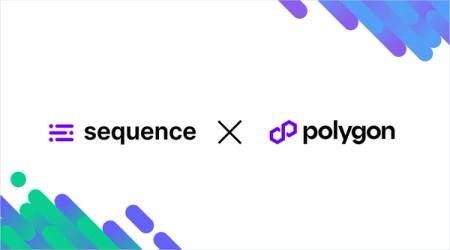
Today marks a major milestone: Polygon Labs is acquiring Sequence.
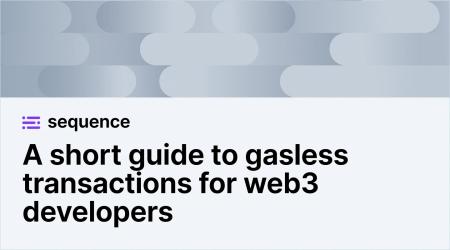
A short guide that explains exactly what gasless transactions are, and why they matter for your web3 experience.
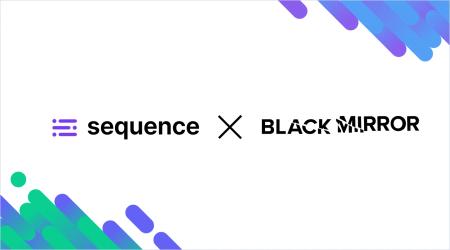
In partnership with KOR Protocol, Sequence and Msquared, Black Mirror's franchise has launched the $MIRROR token and a new web3 experience!
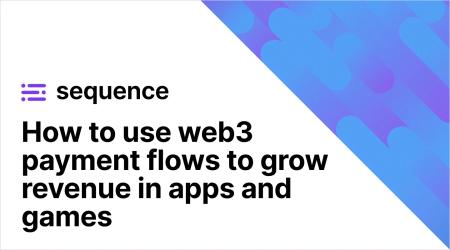
Web3 payment flows allow any app to embed onchain purchases and interactions in a way that feels natural for users. Learn more about them!